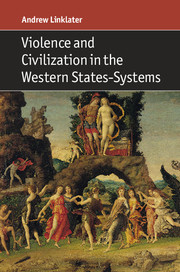Book contents
- Frontmatter
- Epigraph
- Contents
- Preface and Acknowledgements
- Introduction
- 1 The Hellenic City-States System
- 2 New Territorial Concentrations of Power in Antiquity
- 3 The International Relations of Latin Christendom
- 4 The Renaissance City-State System
- 5 The European States-System and the Idea of Civilization
- 6 Cruelty and Compassion in the Age of Empire
- 7 Enlightenment Thought and Global Civilization
- 8 Total Warfare and Decivilizing Processes
- 9 Modernity, Civilization and the Holocaust
- 10 Sovereignty, Citizenship and Humanity in the Global Civilizing Process
- 11 Process Sociology, Civilization and International Society
- Conclusion
- Bibliography
- Index
11 - Process Sociology, Civilization and International Society
Published online by Cambridge University Press: 28 March 2017
- Frontmatter
- Epigraph
- Contents
- Preface and Acknowledgements
- Introduction
- 1 The Hellenic City-States System
- 2 New Territorial Concentrations of Power in Antiquity
- 3 The International Relations of Latin Christendom
- 4 The Renaissance City-State System
- 5 The European States-System and the Idea of Civilization
- 6 Cruelty and Compassion in the Age of Empire
- 7 Enlightenment Thought and Global Civilization
- 8 Total Warfare and Decivilizing Processes
- 9 Modernity, Civilization and the Holocaust
- 10 Sovereignty, Citizenship and Humanity in the Global Civilizing Process
- 11 Process Sociology, Civilization and International Society
- Conclusion
- Bibliography
- Index
Summary
The fact that we have not yet learned how to curb wars, the reciprocal mass destructions of members of different states, and other forms of behaviour that one cannot help calling barbarous, lends support to the assumption that in the overall context of the possible development of humankind what we call modern times represents a very early rather than a late stage of development … We have not yet learned to cope with the obvious contradictions of our age. We know already that human beings are able to live in a much more civilised manner with each other … We know already that much depends on achieving a better balance between self-restraint and self-fulfilment, but a stable social order that warrants such a balance still eludes us. It should not be beyond the reach of humankind in the thousands of years ahead of us
(Elias 2011: 174, italics in original)Elias maintained that Caxton's comment that ‘things that were permitted are now forbidden’ could stand as the ‘motto’ for the civilizing process that was to come (see Chapter 5, p. 201). The European path of social and development shaped diverse and interrelated spheres of social interaction including the standards that governed bodily functions, changes in table manners and (of particular importance for the present discussion) shifts in emotional responses to cruelty and violence. Elias was less consistent on the subject of whether things that were once permitted in the relations between states are now forbidden. His reflections of world politics raised, but did not answer, important questions about whether, or how far, the modern global system is different from its predecessors. One of the aims of this chapter is to consider how the process-sociological analysis of violence and civilization contributes to a comparative analysis of the Western states-systems that attempts to answer the question of how far distinctive understandings of what is permissible and forbidden have developed in contemporary international society.
- Type
- Chapter
- Information
- Violence and Civilization in the Western States-Systems , pp. 425 - 467Publisher: Cambridge University PressPrint publication year: 2017



